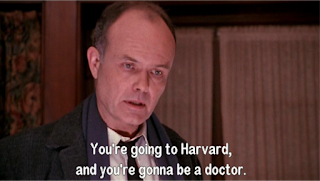In a too-rushed ending to our class on Wednesday, we talked about fathers and their roles in caregiving. Although we can debate family compositions and gender role requirements for happy lives and childrearing outcomes, men make up half of our population in the US or worldwide (or around there, depending on your source of statistics) and it's important that we focus on the impact they make on children through their relationships with them, and how we can support men in being nurturing fathers.
As a great transition to next week as we talk about the beginning of life and what babies need, here's the clip on fathers that was listed for week 2 in our class. It's from the "I Am Your Child" series. It's called 'To Be a Father."
 Also, a picture from the new NBC series, "This is Us." As you watch the video (a bit dated but still relevant), consider the roles that fathers play in the new life that is a baby. How is it different, or as Ray Romano says, a transition from the way fathers used to be involved (or should we say, were 'only' involved)?
Also, a picture from the new NBC series, "This is Us." As you watch the video (a bit dated but still relevant), consider the roles that fathers play in the new life that is a baby. How is it different, or as Ray Romano says, a transition from the way fathers used to be involved (or should we say, were 'only' involved)?What factors influence how father's father their children? What do we want them to do and be for their children? And what messages to them support and reinforce caregiving as being more than 'the wallet' and 'the disciplinarian'?
Consider your own father, or the person who has functioned most closely as a father to you. What roles does this person play in your life (in concert or perhaps separate from your mother)? How has this person shaped who you are today?




